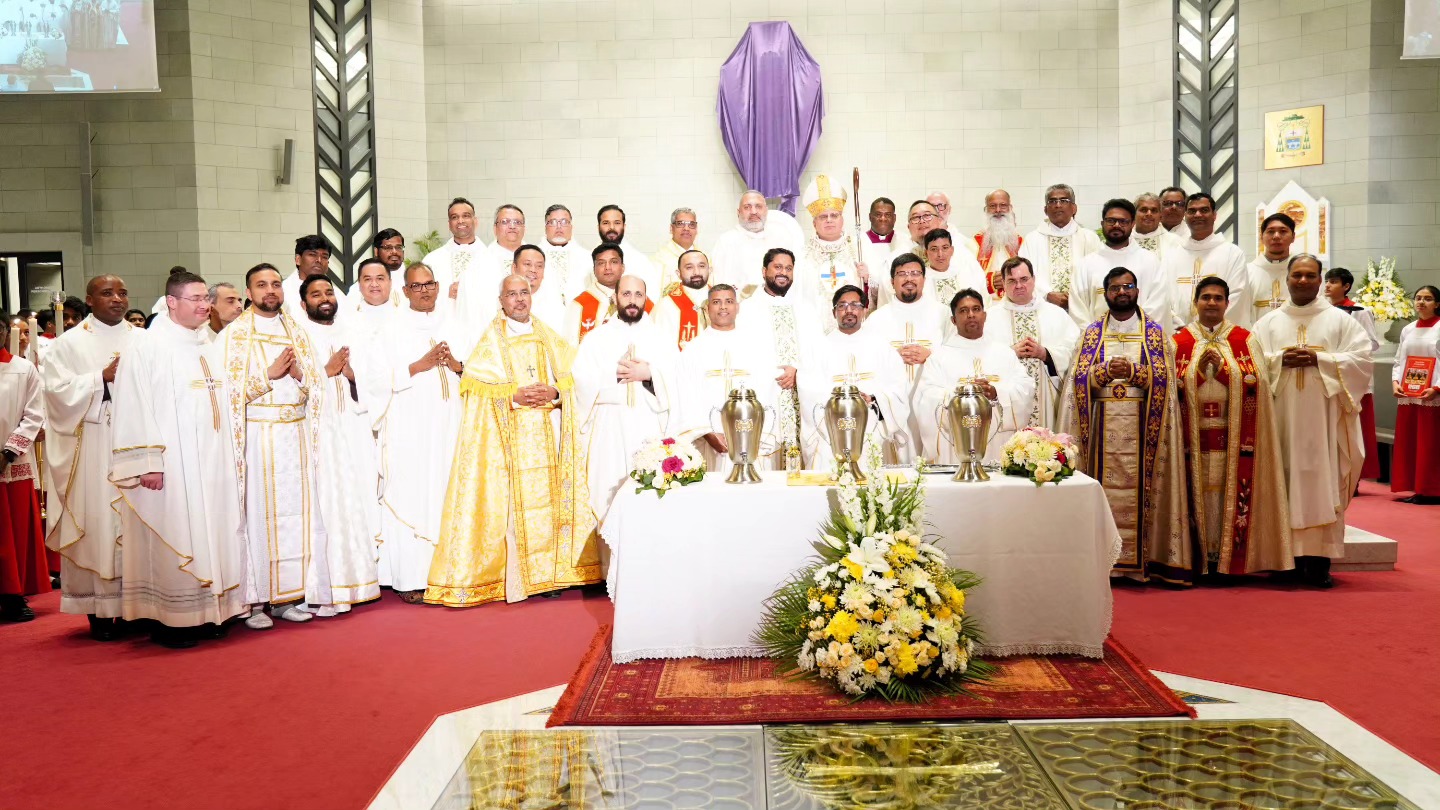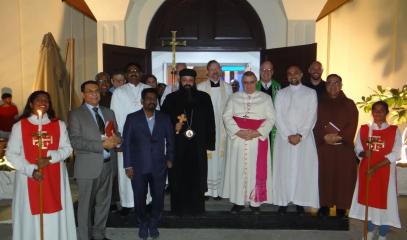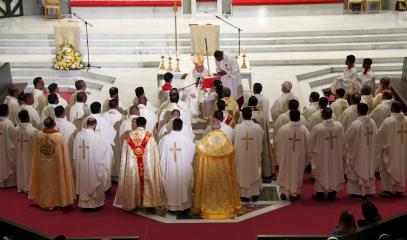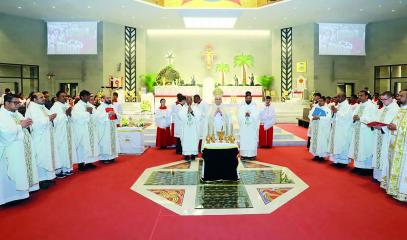Easter rituals in the Church that has become a ‘home’ for migrants in the Vicariate of Arabia
Bishop Berardi recounts Holy Week among Catholics in the Gulf, a ‘unique’ reality due to the multitude of rituals and languages. Expatriates in Saudi Arabia use the internet and television to follow the celebrations. Prayers for peace in the Holy Land, Lebanon, Syria and Yemen. The meaning of the mission, which is ‘first and foremost personal conversion’.
Milan (AsiaNews) - A ‘unique’ reality in which migrants ‘rediscover’ in the Church what was once their homeland, build bonds and manage to overcome even the ‘only difficulty’ posed by language, because ‘not everyone speaks Arabic or English’. This is what the Apostolic Vicar of Northern Arabia, Monsignor Aldo Berardi, a priest of the Order of the Holy Trinity and of the Slaves, of which he was Vicar General, for over two years at the helm of a complex but richly diverse territory, told AsiaNews.
‘They are migrants or, rather, “expats”,’ he explains, ‘because no one stays here for long or takes citizenship by birth or acquisition. People who return or emigrate to other countries, but the Church, with its sacraments, its doctrine, its universal rites and its celebrations,’ such as today, Holy Thursday, ’make them feel at home.’
The Vicariate of the North extends its jurisdiction over four countries on the peninsula, each with different social, political and religious freedom situations: Bahrain, Kuwait, Qatar and Saudi Arabia, the latter being a country where no religion other than Islam is permitted but where there is a Catholic presence.
In 2020, upon the death of the last vicar, Monsignor Camillo Ballin, who was succeeded as administrator by Monsignor Paul Hinder, former vicar of Southern Arabia, there were almost 2.8 million baptised Catholics out of a population of approximately 43 million. The territory is divided into 11 parishes, with its headquarters in Awali, Bahrain, where the Cathedral of Our Lady of Arabia stands.
It is a community made up of a large majority of economic migrants from Asia, especially India, and different rites such as that of the Syro-Malabar, to whom Pope Francis has granted jurisdiction over those who are in the Middle East for work.
Different faces, origins and stories that, during festive celebrations such as Holy Week, rediscover ‘a sense of belonging: the church is not just a building but their home because they are welcomed there, bonds are formed and it becomes a point of reference.
Even if they do not have Mass in their native language, they follow the service,’ continues the prelate, ’and then at the end they stay in the courtyard, talk to the priest, to their bishop [the apostolic vicar, ed.], ask for blessings and discuss their difficulties.’
The territory of the Northern Vicariate also includes Saudi Arabia, the cradle of Sunni Islam, where only the Muslim religion is permitted but which, in reality, is home to about one million Catholics, migrant workers or expatriates.
‘At Easter, the faithful follow services online,’ says the prelate, ’and often tune in to television channels in their country of origin or use the internet to listen to Masses and celebrations in their own language.’
Despite the difficult conditions, because it is forbidden to practise their faith in public, Christians in Saudi Arabia maintain a ‘link’ with the churches in the region, in particular ‘with the Cathedral of Our Lady of Arabia: those who can,’ continues Monsignor Berardi, ‘cross the border and go to Bahrain or Kuwait to attend services. The busiest times coincide with the main Muslim holidays, when Christians also benefit from two or three days off.’
‘They arrive by car or bus to pray, and we take the opportunity to administer the sacraments, from baptism to confirmation, with special ceremonies organised for them and a certain flexibility in the preparation of the sacraments, which is also done online.’
The message sent out by the Vicariate, emphasises Monsignor Berardi, is that of a Church that is ‘stable and rooted, even if people come and go, but there is always this immensity of believers: two million faithful in the north, plus another million from the south.’
And Pope Francis' visit to Abu Dhabi (United Arab Emirates, in 2019) and Bahrain (November 2022) has guaranteed “even greater recognition and visibility,” a presence based on the values of “generosity and solidarity.”
“There is a strong emphasis,” he adds, ’on the theme of coexistence, which means respect for others and goes beyond tolerance, which does not imply encounter.
Coexistence is a step further’ and encourages us to think about how to “live together, respect diversity” starting from “common ground” while leaving elements of conflict, such as theology, on the sidelines. “After two years in the vicariate,” he says, ’solid relationships are being forged, based on sharing space and discussion.’
‘We began Holy Week last Friday, 11 April, because people are freer to participate. Each rite has its own traditions and the programme of services is very intense for all the parishes,’ says the vicar.
’On Tuesday evening, we celebrated the Chrism Mass with all the parish priests from the different churches in Bahrain and some from outside who came to collect the oils. In addition to the ministers, there are also lay people present,’ he continues, ’a beautiful assembly for this particular service, each rite with its own traditional dress, from the Maronites to the Malabarese, symbolising the unity of the Church around the bishop, a concept of great importance for the territory.’
‘The Latin rite,’ he adds, “remains the most important because it represents the majority of the faithful, but even in this case, Mass is celebrated in different languages.”
From the cathedral to the churches, to the Catholic school that the Manama authorities allow to be used to celebrate Mass on major holidays, places of worship are packed with thousands of faithful.
In Qatar and Kuwait, the influx is uninterrupted because the Eastern rites last for hours, are celebrated in the evening, at night, early in the morning, and everyone has their own particular way of celebrating Good Friday, from the Way of the Cross to the funeral of Jesus.
‘From tomorrow until Sunday,’ explains Monsignor Berardi, ’it is a continuous event, which also reflects the richness of the Church and the Vicariate of the Gulf. Everyone wants to kiss the cross.’
The Easter celebrations are inevitably intertwined with the period of profound tension that characterises the Middle East and various other areas of the world.
‘At every Mass,’ says the vicar, ’we pray for peace. At the end of every Sunday service, there is a special prayer that I have entrusted to all the parishes to invoke harmony, conversion and dialogue in the Holy Land [to identify Israel and Palestine], Syria, Lebanon and Yemen.’
The Arab Catholic community in particular, he continues, ‘is suffering from the situation; from the Syrians to the Palestinians, there is great concern. There is also great attention to Yemen because “it is close to us, it is part of the Vicariate of the South, there are nuns there, and it is sad that people are suffering. Now,” he adds, ’there are also tensions between Iran and Israel (and the United States). We, who are in the middle, pray even more fervently for peace.’
Finally, he makes a last appeal to the “mission,” which has particular characteristics in the Gulf, where proselytism is forbidden: ’We must convert ourselves more and more personally. Here, being a missionary means being one for oneself, developing this Catholic identity, Catholic morality, and the spirituality that makes us recognisable. Many cannot come to church,’ he concludes, ’which is why we are reflecting on how to reach them through different means.’
07/02/2019 17:28
24/10/2019 17:56










.png)










